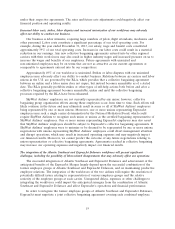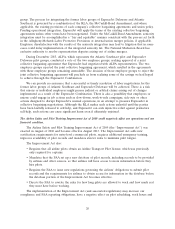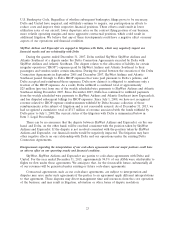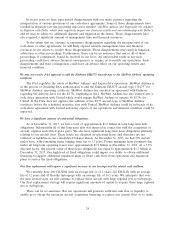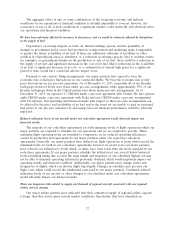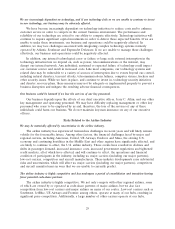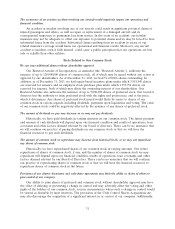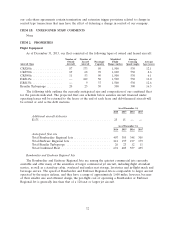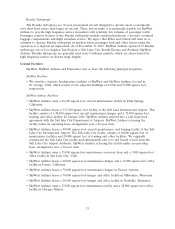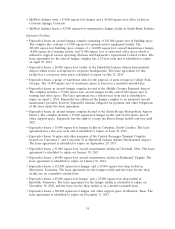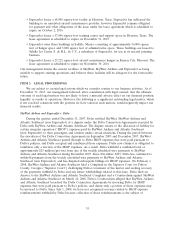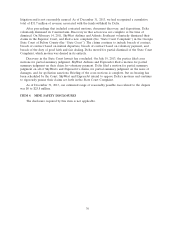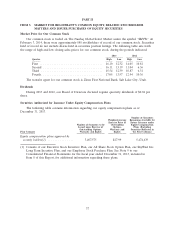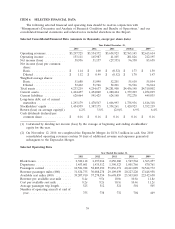SkyWest Airlines 2013 Annual Report Download - page 34
Download and view the complete annual report
Please find page 34 of the 2013 SkyWest Airlines annual report below. You can navigate through the pages in the report by either clicking on the pages listed below, or by using the keyword search tool below to find specific information within the annual report.We are increasingly dependent on technology, and if our technology fails or we are unable to continue to invest
in new technology, our business may be adversely affected.
We have become increasingly dependent on technology initiatives to reduce costs and to enhance
customer service in order to compete in the current business environment. The performance and
reliability of our technology are critical to our ability to compete effectively. Technology initiatives will
continue to require significant capital investments in order to deliver these expected benefits. If we are
unable to make these investments, our business and operations could be negatively affected. In
addition, we may face challenges associated with integrating complex technology systems formerly
operated by Atlantic Southeast and ExpressJet Delaware. If we are unable to manage these challenges
effectively, our business and operations could be negatively affected.
In addition, any internal technological error or failure or large scale external interruption in the
technology infrastructure we depend on, such as power, telecommunications or the internet, may
disrupt our internal network. Any individual, sustained or repeated failure of technology could impact
our customer service and result in increased costs. Like most companies, our technology systems and
related data may be vulnerable to a variety of sources of interruption due to events beyond our control,
including natural disasters, terrorist attacks, telecommunications failures, computer viruses, hackers and
other security issues. While we have in place, and continue to invest in, technology security initiatives
and disaster recovery plans, these measures may not be adequate or implemented properly to prevent a
business disruption and mitigate the resulting adverse financial consequences.
Our business could be harmed if we lose the services of our key personnel.
Our business depends upon the efforts of our chief executive officer, Jerry C. Atkin, and our other
key management and operating personnel. We may have difficulty replacing management or other key
personnel who cease to be employed by us and, therefore, the loss of the services of any of these
individuals could harm our business. We do not maintain key-man insurance on any of our executive
officers.
Risks Related to the Airline Industry
We may be materially affected by uncertainties in the airline industry.
The airline industry has experienced tremendous challenges in recent years and will likely remain
volatile for the foreseeable future. Among other factors, the financial challenges faced by major and
regional carriers, including American, United, US Airways, Endevor and Mesa, the slowing U.S.
economy and continuing hostilities in the Middle East and other regions have significantly affected, and
are likely to continue to affect, the U.S. airline industry. These events have resulted in declines and
shifts in passenger demand, increased insurance costs, increased government regulations and tightened
credit markets, all of which have affected, and will continue to affect, the operations and financial
condition of participants in the industry, including us, major carriers (including our major partners),
low-cost carriers, competitors and aircraft manufacturers. These industry developments raise substantial
risks and uncertainties, which will affect us, major carriers (including our major partners), competitors
and aircraft manufacturers in ways that we are unable to currently predict.
The airline industry is highly competitive and has undergone a period of consolidation and transition leaving
fewer potential code-share partners.
The airline industry is highly competitive. We not only compete with other regional airlines, some
of which are owned by or operated as code-share partners of major airlines, but we also face
competition from low-cost carriers and major airlines on many of our routes. Low-cost carriers such as
Southwest, JetBlue, US Airways and Frontier among others, operate at many of our hubs, resulting in
significant price competition. Additionally, a large number of other carriers operate at our hubs,
29


